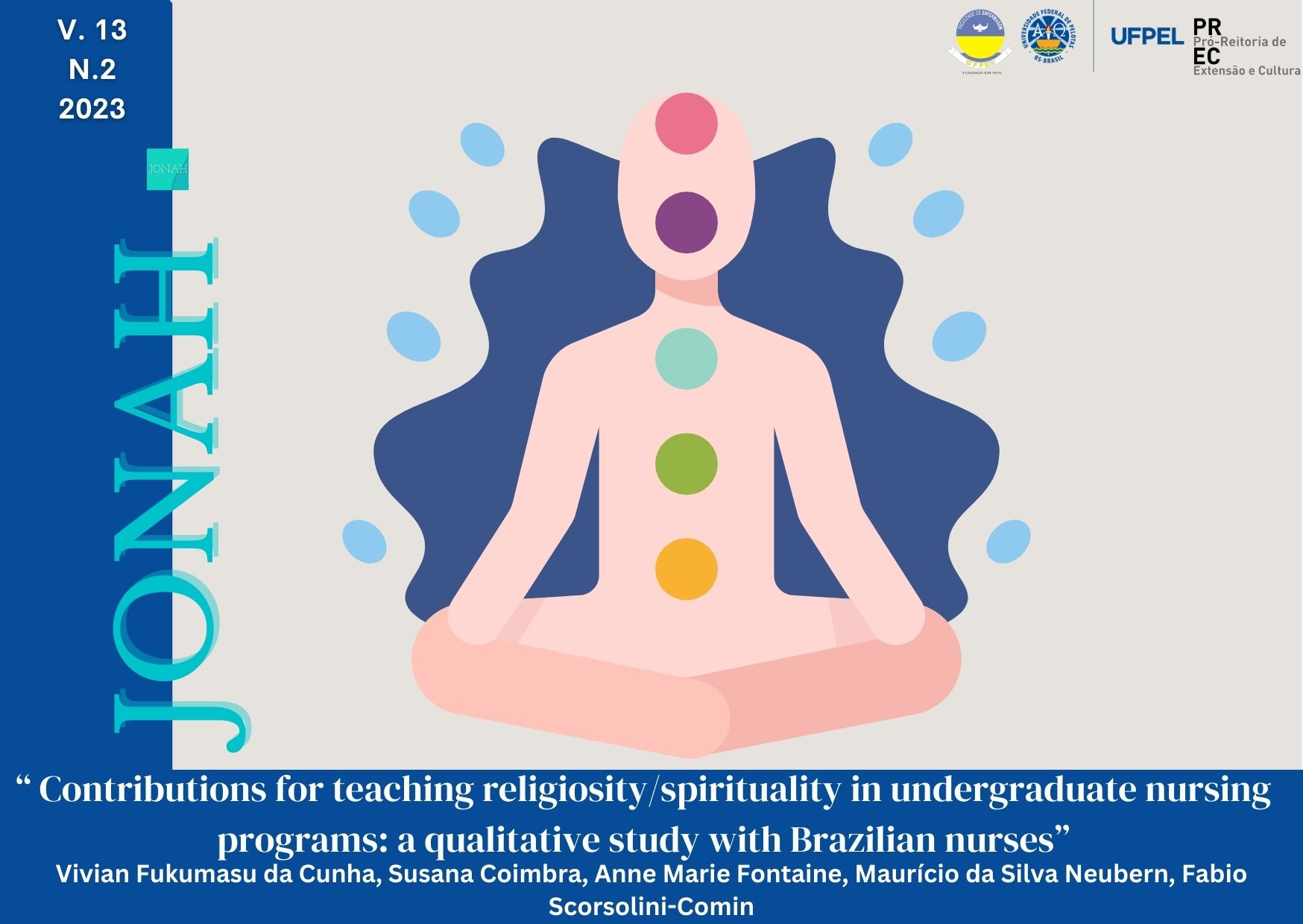Contributions for teaching religiosity/spirituality in undergraduate nursing programs: a qualitative study with Brazilian nurses
Resumo
Objective: to identify and collect recommendations for teaching religiosity/spirituality in undergraduate Nursing courses of nurses working in a Hospital. Method: this is a qualitative study, with 34 nurses interviewed. The research corpus was fully transcribed and submitted to content analysis. Results: the religiosity/spirituality theme was absent in the graduation of most of professionals. They mentioned the restricted preparation to deal with human issues and for being a dimension that offers a resource to face the challenges of the daily life of the profession. What mitigated this gap was that some professionals have their own religious/spiritual beliefs, which have often guided how this religious/spiritual support is provided in health care. Conclusions: participants suggest the presence of religiosity/spirituality teaching in nursing graduation effectively and practically, not only theoretically reinforce its importance. Taking religiosity/spirituality content to undergraduate courses can be sensitive to the holistic needs of patients/users and even the professionals themselves.
Downloads

Copyright (c) 2023 Universidade Federal de Pelotas

This work is licensed under a Creative Commons Attribution-NonCommercial 4.0 International License.
INSTRUÇÕES: Copiar o texto a seguir em arquivo DOC, preenchendo corretamente o título, imprimir, assinar (todos os autores) e submeter nos ARQUIVOS SUPLEMENTARES o arquivo escaneado em formato PDF, com tamanho máximo de 1MB.
DECLARAÇÃO DE RESPONSABILIDADE E AUTORIA E DE CESSÃO DE DIREITOS AUTORAIS
Submetemos à aprovação do Journal of Nursing and Health (JONAH) o manuscrito "TÍTULO (máximo 15 palavras)", e declaramos que o trabalho é inédito, original e está sendo enviado com exclusividade ao Journal.
Concordamos que em caso de aceitação do manuscrito, os direitos autorais a ele referente passarão a ser propriedade exclusiva do Journal of Nursing and Health (JONAH), sob licença Creative Commons 4.0 e com a divulgação do artigo em mídias sociais da Revista.
Informamos igualmente que todos os procedimentos éticos devidos foram observados, não infringindo nenhum copyright ou nenhum outro tipo de direito de propriedade de outras pessoas e todas as citações no texto são fatos verdadeiros ou baseados em pesquisa de exatidão científica.
Declaramos que cada autor (NOME DOS AUTORES DO MANUSCRITO EM ORDEM) do artigo contribuiu substancialmente para a concepção e planejamento do estudo, seu projeto, obtenção de dados ou análise e interpretação de dados; também contribuiu significativamente com a elaboração do esboço ou a revisão crítica importante do conteúdo intelectual deste manuscrito e aprovou a versão final do manuscrito.
Concordamos em ser responsável por todos os aspectos do trabalho, garantindo à exatidão ou à integridade de qualquer parte da obra.
E por fim, declaramos que FORAM OU NÃO FORAM UTILIZADOS recursos de inteligência artificial para a construção do texto. (CASO TENHA SIDO UTILIZADO ALGUM RECURSO DE IA, INFORMAR SE FOI PARA ESCRITA / MELHORAMENTO DO TEXTO, PRODUÇÃO, ANÁLISE OU GERAÇÃO DE DADOS).
Categoria do artigo: ______________________________
Data: ___/____/____
Nome completo do autor:________________________
Assinatura: ______________________________
Nome completo do autor:________________________
Assinatura: ______________________________
Nome completo do autor:________________________
Assinatura: ______________________________
Nome completo do autor:________________________
Assinatura: ______________________________
Nome completo do autor:________________________
Assinatura: ______________________________
Versão em inglês - English version
INSTRUCTIONS: Copy the following text into a DOC file, correctly filling in the title, printing, signing (all authors) and submitting the scanned file in PDF format to the SUPPLEMENTARY DOCUMENTS, with a maximum size of 1MB.
DECLARATION OF RESPONSIBILITY AND AUTHORSHIP AND COPYRIGHT ASSIGNMENT
We submit the manuscript "TITLE (maximum 15 words)" for approval by the Journal of Nursing and Health (JONAH) and declare that the work is unpublished, original and is being sent exclusively to the Journal. We agree that if the manuscript is accepted, the copyrights related to it will become the exclusive property of the Journal of Nursing and Health (JONAH), under a Creative Commons 4.0 license and with the dissemination of the article on the Journal's social media. We also inform that all due ethical procedures were observed, without infringing any copyright or any other type of property right of other people and all citations in the text are true facts or based on scientifically accurate research. We declare that each author (NAME OF MANUSCRIPT AUTHORS IN ORDER) of the article contributed substantially to the conception and planning of the study, its design, data acquisition or data analysis and interpretation; also contributed significantly to the preparation of the draft or the important critical review of the intellectual content of this manuscript and approved the final version of the manuscript. We agree to be responsible for all aspects of the work, ensuring the accuracy or integrity of any part of the work. And finally, we declare whether artificial intelligence resources WERE OR WERE NOT USED for the construction of the text. (IF ANY AI RESOURCE WAS USED, INFORM WHETHER IT WAS FOR WRITING/IMPROVING THE TEXT, PRODUCTION, ANALYSIS OR DATA GENERATION).
Article Category: ____________________________________________________
Date: ___/____/____
Author's Full Name:____________________________________________
Signature: ________________________________
Author's Full Name:_____________________________________________
Signature: ________________________________
Author's Full Name:_____________________________________________
Signature: ________________________________
Author's Full Name:_____________________________________________
Signature: ________________________________
Author's Full Name:_____________________________________________
Signature: ________________________________


